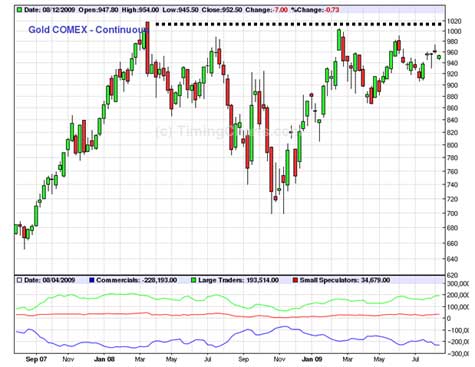This is true, dear gold bug. The big money is made in the big move. When Edward Land was putting Polaroid all over the charts back in the 1950s and ‘60s, traders watched it in awe. They didn’t buy, but they watched it in fascination. They didn’t buy, you see, because it was always too high. It danced above their buy point like the carrot one dangles over the donkey’s nose – just out of reach. Then it would move up on another leg, and they would curse the universe.
It wasn’t the universe’s fault, dear gold bug. The universe isn’t a kindly and benevolent universe. And it isn’t a mean and nasty universe. The universe just goes along doing its own thing. And as for the markets, well the markets are made up of human beings. And those human beings want just what you want, dear gold bug. They want to buy low and sell high. They want to make a profit.
Now think about this for a moment. You want to buy low and sell high on gold. You want to make money. But there is no money in the market itself. Each market trading each economic good is a profit-making enterprise. They make money by taking it from you (via commissions). You are not going to make your profit from the exchange. YOU HAVE TO MAKE IT FROM THE OTHER TRADERS. In order for you to buy low and sell high, someone else has to sell low and buy high. In order for you to make money, he has to lose money.
To make money in the markets, YOU HAVE TO BE SMARTER THAN THE OTHER GUY.
OK, how can we be smarter than the other guy? How can we make money in the markets by taking it from him? Well, there is one thing about economics that a lot of people do not understand. In the 13th century, Thomas Aquinas said that every good had to sell at its fair price.
Now this is wrong, dear gold bug. Adam Smith taught that there was no such thing as a fair price. The only “fair†price was the price agreed upon by buyer and seller. However, most people do not understand this. They are back in the 13th century with Thomas Aquinas. So we believers in Adam Smith are smarter than the believers in Thomas Aquinas, and we are going to use these smarts to take their money.
What has gold been doing for the past year-and-a-half? It has been moving sort of sideways. More accurately, it has been moving as though there were a big hand pressing on it every time it gets close to $1000: The simple minded people say that gold cannot penetrate $1,000. Every time it comes up to it, it turns down. Therefore, $1,000 is (the high end of) the fair price. Anyone who buys close to $1,000 is going to take a licking.
These people are our meat. We eat them up. In order for us to make money, they must lose money. Why has gold reacted every time it has hit $1,000? The first time, in March 2008, it reacted because it had reached the price objective of a giant triangle which broke out in Sept. 2007. This triangle is shown on our website, www.thegoldspeculator.com, click on Gold and Gold Stock Prices.
In common sense terms, the price objective line represents a good point for profit taking.
Gold had a nice run from Sept. ’07 to March ’08, and it was time for many people to take their profits. The technical pattern helps us to identify this point.
In this case, the profit-taking reaction was caught up in a general commodity sell-off over the last part of 2008. Pretty much every commodity went down as speculators believed the media reports that we were suddenly in a wave of “deflation.â€Â Still, what was remarkable about this decline was that gold had a smaller decline than any other good, and gold hit bottom on Oct. 24, 2008, earlier than any other good. Both of these things have to be regarded as bullish.
Then gold rebounded and came back to $1,000 in Feb. 2009. This also much be considered as a bullish indication because no other commodity or stock achieved the same thing. Of course, once gold had hit $1,000 a second time, the followers of Thomas Aquinas were back again with their mistake about the fair price.   You see, Aquinas was not very clear about what he regarded as a fair price. So believers in the fair price theory don’t really know what is a fair price for a good. They simply used whatever price stands out in their minds. If an economic good moves sideways for a substantial period of time, they decide that is the fair price. If the good then moves up, they become envious and want to buy it. But most of them will not actually buy until the good returns back to its “fair†price. This level then becomes what technicians call support. The reverse happens if it moves down from the sideways period. They resolve to sell it if it can only get back to its “fair†price. This level then becomes resistance. The same thing is true if the trading area acquires high volume or forms an important high or low on the charts (like the bottom of Black Monday 1987). After the gold decline of late 2008, the peak of $1,000 stood out on the charts. It thus became a “fair†price (or a fair/high) price. These people came in to sell in February 2009. This was the reason that gold turned down the second time from $1,000. I called both the March ’08 and the Feb. ’09 tops in the One-handed Economist, not to turn bearish on gold but to stand aside from my previous bullish positions. (See, the Feb. 20 sample issue on my website, www.thegoldspeculator.com. At this time, I stepped aside from my gold stock positions and reentered them on May 26 with gold at $960.
But the resistance at $1,000 is not writ in stone. It is nothing more than a finite number of people who have made a mistake. When gold hit $1,000 in Feb. 2009, many of them sold. When it rebounded to $980 in June 2009, most of those people had already sold. There were only a few of them left. Therefore, the gold reaction on this third approach to $1,000 could not go very far. Indeed, the market turned before it hit $900. Each time the gold market reaches the $1,000 level, there is less selling force.
So you see how stupid these fair price people are. In reality, the selling force at $1,000 is getting weaker and weaker, and we can see this from the fact that the declines from that level are smaller and smaller. But just the opposite happens in their minds. In their minds, the idea that $1,000 is a fair/high price gets reinforced each time, and they become more and more confident. So the selling force at $1,000 is becoming weaker, and they are becoming more bearish. This is one example of why it is so easy to take these people’s money.
This bearish confidence has been expressed in several articles which have appeared on gold in recent months. If you happen to read one, then write the author an e-mail. Ask him how he can defend the theory of the fair price when it has brilliantly been refuted by Adam Smith? Or you may decide not to bother educating this poor fellow and just take his money by buying gold. (He will probably just get mad at you for disagreeing with him anyway.)
Indeed, we gold bugs are very lucky. Our opponents in this modern age are crazy Keynesians. Keynes had no rational arguments against gold. He merely made up insults like “barbarous relic.â€Â Not only are his followers stupid, but they are so pig headed that they cannot admit that they have been wrong. In the 1970s, after the price of gold had risen for 9 years (1970 to 1979) and had gone from $35 to $400, Fortune Magazine printed an article by Martin Mayer in which he called the gold bugs a “lunatic fringe.â€Â The people who had failed to predict this rise he called the “respected authorities.â€
So this is the world into which you were born, dear reader. The “lunatic fringe†turns out right, and the “respected authorities†have egg on their face. Is it any wonder that these people do not learn from the past? To learn from your mistakes, you have to be able to admit that you have made them. And the beauty of this is that throughout the nation there are all these Keynesian economics professors turning out a new class of miseducated Keynesian idiots every year. Here they come out of the classroom, marching into the financial markets to lose their money to you and me. Bless you crackpot Keynesian professors. Bless you stupid Keynesian students.
One of the big mistakes made by most students of the markets is to get too close to them. It is a question of not being able to see the forest for the trees. Gold has been moving sideways since February, and gold bugs agonize with every reaction and feel their spirits lifted with every rally.
In my experience, there are very few people who can predict the very short term moves. The longer the term upon which you focus the more things come into perspective. When I have a problem, I go back to the gold chart of the 1970s. When I can take in a decade-long move in a glance, suddenly things become clear.
This is why THE BIG MONEY IS MADE IN THE BIG MOVE. The people who make money in the markets are the people who latch onto a giant move, be it Polaroid in the ‘50s and ‘60s, gold in the ‘70s or Yahoo in the late ‘90s. This is not hard to do. Compared to predicting the short term it is easy. The problem is that most people live in the moment. Our emotions pull us in and get us excited about little moves. We lose the big picture, and this leads us to make the wrong decision.
One event which shaped my thinking was a gold conference I attended in late 1972. At that time, it was the standard prediction among gold bugs that gold would hit $70/oz.. (You can see how timid they were and, although better than the establishment, how woefully they under estimated reality.) At that time, gold had reached $65 and then went into a 7 month sideways movement around that price. At the conference, a true-blue $70 man got up to give his speech. It was full of pessimism. He was giving up the hope that gold would ever reach $70, he was sad to say. I remember thinking, “Gee, the fellow has been 6/7 right. Couldn’t he at least give it a few more months?â€Â In February 1973, gold rocketed above $70/oz. By mid year, it was above $120. By the end of 1974 (legalization of gold ownership), it was just shy of $200. And of course by early 1980 it had hit $875. From the perspective of history how foolish those fears seemed.
So remember, we are in this for the long haul. During the second downswing of the commodity pendulum (1980-1999) Volcker and Greenspan went wild creating money. You all have read that Volcker is famous for tightening credit. Well, his short tightening period (1978-1981) consisted of reducing the rate of increase in the money supply from 8% (in 1978) to 6.9% (in 1981). Then he went wild and increased the rate of money creation to 16.9% by 1986. Greenspan was almost as bad, increasing the money supply by 14.3% in 1992. (Then Ross Perot ran for President on the balanced budget ticket and so badly scared the establishment that the money supply went flat for the next 8 years.) From 1978 to 1993, the nation’s money supply tripled.
Bernanke is worse than Volcker or Greenspan, and Obama appears to be worse than Reagan, Clinton and the two Bushes. The money supply figures are so horrific that the Fed has taken to lying about them, reclassifying demand deposits (which are money) as time deposits (which are not money). The deposits so reclassified can still be demanded at any time by their owners, and they can be used to buy things. They are money by anybody’s definition. Figured correctly, I estimate the increase in the U.S. money supply over the past year at 70%. This is the bottom line to all of these trillion dollar deficits, now projected as far as the eye can see. We are now in the hands of a crazy man. The country is being destroyed, and its currency is being destroyed. As to the first, only Ron Paul can help you. But as to the second, you can help yourself.
For this reason, I write a financial newsletter to predict the markets and the economy. It costs $300/year and would be cheap at twice the price (which it may have to be in the not-too-distant future if Obama has his way). This is because it contains the most valuable commodity in the universe – truth. One man plus the truth is an army. If you want my army on your side, then visit my web site at www.thegoldspeculator.com. If you want some more truth thrown in for free, then visit my blog site, www.thegoldspeculator.blogspot.com. In this week’s blog, “Thank You Wall Street Journal,†I deliver a ringing defense of traditional American medicine. I quote Winston Churchill and the Rasmussen poll. And if you aren’t ready to fight after reading it, then I miss my guess.
You have been told that the truth will set you free. This is true. But the truth will also make you a lot of money. Subscribe to the One-handed Economist and find out. Thank you for your interest.
# # #









0 Comments